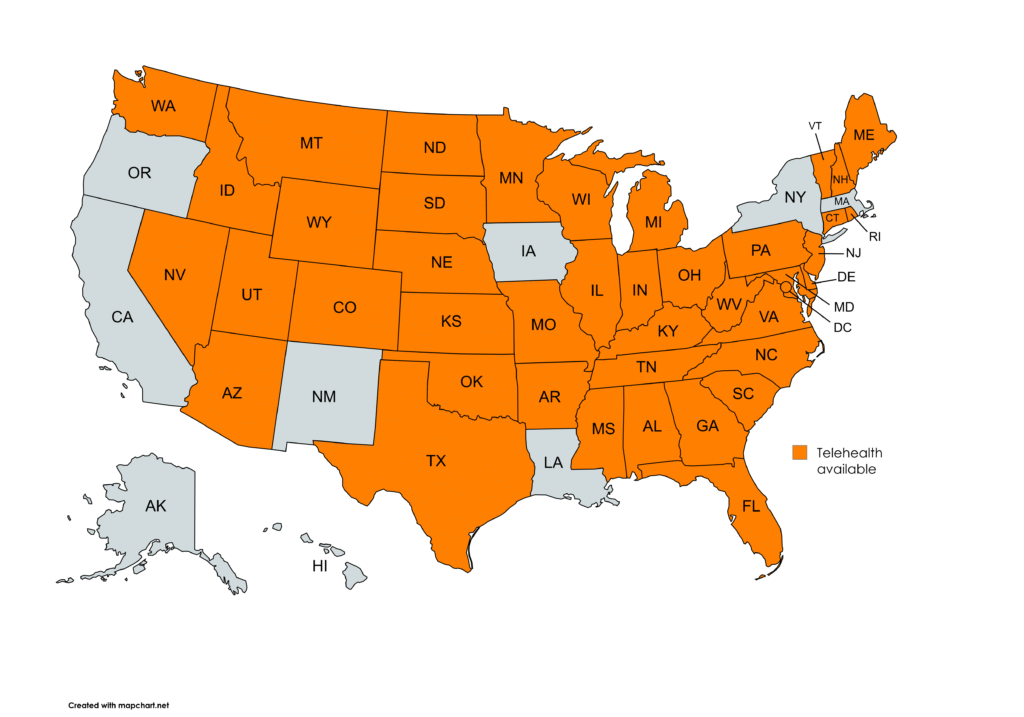Telehealth

Everyone has different preferences when it comes to therapy setting. Some people prefer the familiarity of meeting in person, while others prefer the convenience of attending sessions from their home or office. Research shows that virtual therapy is similar in effectiveness to in-person therapy, and since 2019, I’ve been offering telehealth as a flexible, accessible option for clients. Many have found it to be a valuable tool for staying consistent with therapy, even during busy or unpredictable times. Some benefits of using telehealth include:
-
Keep your appointment (and avoid late cancellation fees) when you’re feeling under the weather, are running behind, or forgot about your appointment
-
Avoid time spent commuting or sitting in traffic
-
Attend sessions from almost anywhere – in another city or state, or while traveling
-
Enjoy greater flexibility in scheduling
While virtual therapy works well for many, it may not be suitable for everyone – particularly those experiencing a crisis or needing more intensive, in-person support. However, for most individuals looking to work through challenges on a weekly basis, telehealth can be an excellent fit.
If you’re unsure which format is right for you, I’m happy to discuss what might work best during your initial consultation.
Interstate Telehealth
I have met all requirements and have obtained an Authority to Practice Interjurisdictional Telepsychology (APIT) from the PSYPACT Commission. What that means is that I have the authority to be your telepsychology therapist if you live in any of 41 approved states in addition to the District of Columbia and the Commonwealth of the Northern Mariana Islands. To see if you live in an eligible state, check the map on this page.
I operate in the United States Eastern Time (ET) Zone in a locale that observes daylight savings time (DST). If you live in a different time zone, you can use worldtimebuddy.com to convert your appointment time to the time in your location.
The Technical Stuff
While you may be more familiar with commonplace video platforms like FaceTime or WhatsApp, the platform I use for telehealth is specifically designed to meet the privacy and security standards required for healthcare.
This platform, VSee, uses military-grade, secure, end-to-end encryption to ensure that our communication remains completely private. This means that any audio or video data transmitted between your device and mine is fully encrypted — rendered unreadable to anyone who might attempt to intercept it, including VSee itself. Not even the platform’s own team can access the contents of our sessions.
To further protect your privacy, VSee provides a Business Associate Agreement (BAA) in compliance with HIPAA regulations. This agreement ensures the company is responsible for safeguarding your personal health information and is required to report any data breaches immediately.
Your confidentiality is top priority, and I’ve selected a premium telehealth platform to ensure that your telehealth experience is not only convenient, but also secure.
Privacy / Security
I take appropriate measures to protect the privacy and security of our telehealth communications. To help ensure confidentiality on your end, I encourage you to take reasonable precautions as well — such as using a secure, private internet connection (avoiding public Wi-Fi) and protecting your device with strong passwords.
For the best experience, please join sessions from a space that is quiet, free of distractions, and offers sufficient privacy.
Fees / Insurance
Most insurance providers are now providing coverage for telehealth counseling/therapy services. My fees for telehealth are the same as those for in-person psychotherapy.




